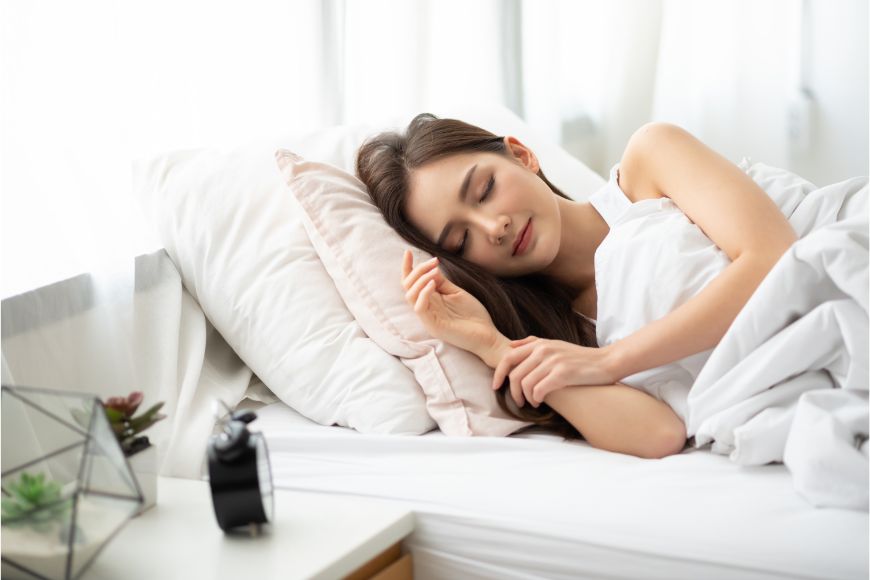Getting enough sleep at night time is crucial for our health and wellbeing, as it can drastically alter how we feel during the day. During sleep, our bodies work to support healthy brain function and maintain our physical health. It can also affect other aspects of everyday life, such as how well you think, react, work, learn and interact with others.
By transforming your bedroom into a sleep sanctuary, you can create an environment that promotes relaxation, improves sleep quality and ultimately boosts your overall wellbeing. By implementing tweaks to your surroundings, habits and routines, you will be able to create a sleep sanctuary that applies to your needs.
In this article, we will explore how you can create a sleep sanctuary that will improve your well-being and leave you feeling re-energised for the day ahead.
Align your circadian rhythm
You won’t be able to create a sleep sanctuary without aligning your circadian rhythm. This is our body’s internal clock that regulates sleeping patterns, hormone production and digestion. When our circadian rhythm is aligned, we fall asleep easier and our chances of waking up refreshed are increased. It can be difficult to align our circadian rhythms due to artificial light exposure, constant stimulation and irregular sleep schedules.
There are ways that you can attempt to realign your circadian rhythm, such as sleeping and waking up at the same time every day, maximising natural daylight exposure, minimising exposure to blue lights and creating an environment that supports your sleep-wake cycle.
We need to make sure that this realignment matches up to our sleep chronotype. Chronotype reflects the individual variability in the phase of circadian realignment, so you need to make sure you know what chronotype you are.
Declutter your space
A messy room is often associated with poor sleep quality. That’s why it’s important to declutter your bedroom to fall asleep faster and improve your quality of sleep as a whole. If you feel tired throughout the day or fatigued, it is recommended that you clean your room before the next time you go to bed to help improve your sleep and well-being.
A cluttered bedroom can significantly disrupt your sleep for several reasons, such as visual noise, stress triggers and reduced air quality. Whereas decluttering your bedroom will have the opposite effect and you should find yourself waking up more refreshed.
Create a tech-free sanctuary
In this digital era, more people are sucked into the habit of scrolling through their mobile phones before they go to sleep, exposing themselves to the blue light that is synonymous with bad sleep. Exposure to too much blue light will disrupt our sleep cycle, which will significantly reduce our sleep quality and negatively impact our well-being.
If you want to create a sleep sanctuary, you should remove all digital devices from your bedroom. Children specifically should avoid going on their mobile phones at least one hour before bedtime. Using your phone as a morning alarm can also be avoided, as you can opt for a traditional alarm clock instead.
Upgrade your bedding
The quality of your bedding plays a big part in how well you sleep during the night. Sheets, blankets, pillows, and mattresses need to be of quality for good sleep quality, as they all impact your sleep temperature.
Having the wrong pillow can drastically hinder your sleep, as a good pillow should support the curve of your neck so that your spine is aligned during the night. The position you sleep in will matter when choosing a pillow, as side sleepers will be better off on a fuller pillow whereas a thin pillow is better for stomach sleepers. A pillow in between is ideal for back sleepers.
Having cushion covers available on your bed can also be important for sleep if you need an extra boost to support your neck and spine.
The mattress is the most important aspect of your bed, as a good mattress will support your spine and posture, promote pressure relief, enhance comfort and improve overall well-being.
Manage light exposure
Going back to the circadian rhythm, you need to make sure that you manage your light intake during the day and night to keep a healthy sleep cycle. During the daytime, you should expose yourself to more natural lightning and less lighting during the evening when it turns dark.
In the morning, you should open your blinds or curtains to let more natural light into your home. You should also go outside whenever you can so that you can be fully exposed to the daylight, with 30-minute walks sufficing.
At night time, you should dim the lights to minimise exposure before you attempt to go to sleep to create a better sleep sanctuary. If you don’t you can suppress the secretion of melatonin, which can lead to a poorer quality of sleep.



